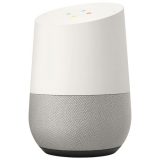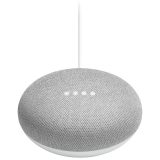 Without a doubt, smart voice control and virtual voice-controlled assistants (like Siri, Alexa, and Google Home) have changed the digital landscape and the way we interact with many of our gadgets and devices.
Without a doubt, smart voice control and virtual voice-controlled assistants (like Siri, Alexa, and Google Home) have changed the digital landscape and the way we interact with many of our gadgets and devices.
However, along with all the wicked awesome things you can do with this tech, smart voice control technology has also given rise to a bit of fear and hesitancy in some to accept and adopt it.
Is it as insidious as some would have you believe, or is it just another way to control your gadgets? I’ll try to clear the smoke by giving you Smart Voice Control Explained: The Basic Facts to Give You Piece of Mind.
What is Smart Voice Control?
Conceptually, smart voice control is not a new idea. Look at the old original Star Trek series from the 60s and you’ll see Kirk and his crew constantly talking to the ship’s computer, asking it to perform certain functions or dole out crucial information to help solve that week’s particular space-shattering problem.
But it wasn’t all TV sci-fi: IBM and the US government were working on voice recognition technology as early as the 70s. By the 90s, some computer systems featured voice recognition, and there were more than a few dictation and writing programs that offered voice recognition.
Of course, those early apps were absolutely bonkers when it came to understanding your spoken words correctly, and if you search the Interwebs, you’re sure to find hilarious examples of when that early tech went wrong.
Since the early 2000s most computers have featured voice command software (like Microsoft’s Cortana), and by 2011 (thanks to the explosion in smartphone use) we finally saw (or rather heard) a voice-controlled assistant reminiscent of the original computer from Star Trek.
Since Siri’s debut, smart voice controlled virtual assistants have become commonplace. They’re now found on our phones, in our cars, and throughout our homes on myriad devices.
What Can You Do with Smart Voice Control?
 Captain Kirk could ask his computer all sorts of things, from the mating habits of those green-skinned Rigellian women, to calling for the ship’s self-destruction.
Captain Kirk could ask his computer all sorts of things, from the mating habits of those green-skinned Rigellian women, to calling for the ship’s self-destruction.
You can also ask your smart voice-controlled assistant to do pretty much anything as well…except for self-destruct. I tried that with Siri on my phone, and she didn’t seem to understand my request. Or, it’s some sort of “I Robot” self-preservation law… beats me. I’m no Isaac Asimov (or even a Will Smith).
In fact, aside from that whole “self-destruct” thing, you can do an awful lot with your smart voice-controlled things.
Most people will love using their virtual assistant for listening to music. Depending on the device and which music services you subscribe to, you can simply ask for a song and it will play (followed by other music in the same genre). You can also stream music to these smart speakers from your smartphone, and, since these things can be linked to your phone, you can even make calls from your contact list using voice commands.
The same goes for texts, although for certain smart speakers you will need additional apps to help (except with Amazon Alexa, which can do it by default).
 The next thing people are going to want to use their smart voice control for (whether it is Google Home, Alexa, Siri on your phone, or whatever) is to connect to their home’s smart devices.
The next thing people are going to want to use their smart voice control for (whether it is Google Home, Alexa, Siri on your phone, or whatever) is to connect to their home’s smart devices.
I don’t have many smart devices, but it is somewhat satisfying to say “OK Google, turn off the kitchen light” and have the lights go out.
Who wants to get up from the couch, like a sucker? So, depending on what devices you have (and compatibility), you can use voice commands to control your lights, thermostat, television, and more. Captain Kirk would be so proud!
And since these smart voice control devices are also able to connect to the Internet, you can even do things like buy stuff online or get the latest weather reports or news. Unfortunately, that Internet connection has folks a bit jumpy and diving into conspiracy theory waters.
Do Smart Voice-Controlled Devices Eavesdrop on Your Conversations?
Every new way to communicate has been plagued by charges that people’s privacy was being violated, from letters, telegraphs, and telephones to emails and text messages. So, it’s only natural that with the rise of smart speaker products like the Google Home and Amazon Alexa, the question of privacy would again rear its tin foil-hatted head.
 So, are your smart voice-controlled devices with built-in voice assistants eavesdropping on your conversations? Well, the answer is yes… and no.
So, are your smart voice-controlled devices with built-in voice assistants eavesdropping on your conversations? Well, the answer is yes… and no.
You see, these devices are always listening. But they are listening for you to say the voice assistant trigger phrase, such as “Hey Siri” or “OK Google,” and not recording your conversations. Apple and Google have had to explain all of this to lawmakers, who were also concerned with privacy.
I know, I know. Everyone and their neighbour has some story about how they were talking to a friend about blue suede shoes or something, and the next thing they know their Facebook feed or web surfing suddenly is coming up with all these ads for blue suede shoes.
Not everyone will believe this, but (and according to the companies themselves) none of these devices records your conversations and sends that data to advertisers.
In the end, it is your own online habits and use that gives it all away. Thanks to you liking things or subscribing to certain pages or sites, advertisers know you like blue, they know spring is when people buy shoes, and gosh darn it, suede is what’s trending in the fashion world.
It is actually more complex than just your phone listening to you and sending data to someone, saying “Jennifer just talked about shoes… let’s get crackin’ on ads!”
Does Smart Voice Control On Occasion Mess Up?
Yes. Like all technology, sometimes these smart things aren’t so bloody smart at all. Sometimes you give a command or ask for some info and get the “I don’t know how to do that” reply. Or, once in a blue moon I’ll say something (to one of my kids) like “OK, grab your bottle of water and we’ll go biking.” The Google Home will then scare the beejesus out of me by suddenly saying “I don’t know how to—of water and we’ll go biking,” misinterpreting me to have said the trigger phrase. It’s funny more than annoying, and a very rare occurrence.
The Final Word
 Smart voice-controlled devices are here to stay. You have one right now in your hand or in your pocket, as all major smartphones feature smart voice assistants.
Smart voice-controlled devices are here to stay. You have one right now in your hand or in your pocket, as all major smartphones feature smart voice assistants.
That new car you want to buy? Chances are it will also have some way to connect or use voice commands.
Your new PC or Mac? It has the ability to take voice commands. Whether you use smart voice control for playing music, creating notifications and calendar alerts, or to control different facets of your home life, this is the future that Start Trek promised. So, embrace it, and see how convenient the technology can make your life.
What are your thoughts on smart voice control? Let me know in the comments section below, and don’t forget to check out smart voice-controlled devices available online at Best Buy.



